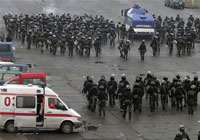Georgian opposition drives anti-Russian President Saakashvili into a corner
The Georgian police used tear gas, rubber bullets and water cannon to break up a crowd of protesters who demand President Mikhail Saakashvili be removed from his position. Saakashvili, known for his anti-Russian and pro-Western stance declared a state of emergency in the country and banned all news broadcasts except state-controlled television.

Saakashvili, a U.S. ally who has tried to integrate Georgia with the West, also expelled three Russian diplomats and accused Moscow of fomenting the protests, which began last week. He now faces the worst political crisis of his four years in office in the former Soviet republic, where a low-level tug-of-war between Russia and the West is being played out.
Opposition supporters have gathered outside parliament every day since Friday, when more than 50,000 rallied. The protesters initially called for changes in the dates of planned elections and in the electoral system. But after Saakashvili rejected their demands and accused their leaders of serving the Kremlin, they made his resignation their central aim.
In the clashes Wednesday, tear gas enveloped parliament after riot police advanced toward the crowd, pushing people back with shields and beating some with truncheons. Demonstrators retreated down Tbilisi's main avenue suffering from the tear gas fired by police from the beds of pickup trucks.
Scattered fist fights broke out between uniformed police and protesters.
Several thousand opposition supporters rallied later in another section of Tbilisi, only to have the protest broken up again by riot police using water cannon and firing rubber bullets.
The clash was captured live on Georgian and Russian television, which showed protesters with bandannas and surgical masks pelting police with rocks from a bridge.
More than 500 people sought medical assistance in the running clashes throughout the day, and nearly 100 remained hospitalized, the Health Ministry said.
A Georgian television station regarded by the government as an opposition mouthpiece went off the air Wednesday night after riot police entered its headquarters. The Imedi station has carried statements by opposition leaders and broadcast footage of police dispersing the protests Wednesday.
Saakashvili later declared a state of emergency in the capital. The measure was then extended to the entire country.
"The state of emergency was introduced for 15 days on the entire territory of Georgia," Economics Minister Georgy Arveladze said in a televised statement.
Arveladze said that the countrywide measure bans street protests and strikes and halts all news broadcasts except those on state-controlled Public Television. "The Public Television of Georgia gets the right to receive and provide information," he said.
Under the Georgian constitution, the state of emergency is effective immediately but must be approved by parliament within two days.
Earlier Wednesday, announcing the emergency measure for the capital, Prime Minister Zurab Nogaideli said "an attempt to conduct a coup was made, and we had to react to that."
In a nearly 30-minute televised address, Saakashvili said he regretted the use of force, but argued that it was necessary to prevent the country from sliding into chaos.
"Everyone has the opportunity to express their protest in a democratic country and I, as a democrat, have always defended the right of people to protest ... but the authorities will never allow destabilization and chaos in Georgia," he said, flanked by Georgian and EU flags.
Many of Saakashvili's opponents support his aims, such as closer ties with the United States and Europe. A visit by U.S. President George W. Bush in 2005 was a resounding vote of support for him.
While pressing closer Western ties, Saakashvili has sought to decrease Russia's influence and to establish central government control over two separatist regions that have run their own affairs with Russian support since wars in the early 1990s.
But there has been growing disillusion with Saakashvili among critics who say he has not moved fast enough to spread growing wealth. Opponents accuse him of sidestepping the rule of law, creating a system marked by violations of property rights, a muzzled media and political arrests.
Russia, which views most countries of the former Soviet Union as its sphere of influence, has watched Saakashvili's turn to the West with alarm. Moscow moved to undermine Saakashvili by deepening ties with the separatist regions and imposing a trade and transportation blockade.
Saakashvili said the opposition leaders have been guided and funded by Russia, whose special services have stepped up their activities in Georgia.
Shortly after, the Foreign Ministry announced the expulsion of three Russian diplomats.
Before Saakashvili's statement, Georgian television stations aired what they said was a taped conversation between opposition leaders and Russian Embassy officials. The opposition said it was a fabrication.
Russia's Foreign Ministry dismissed Saakashvili's claims as an "irresponsible provocation" and said it was an attempt to distract attention from domestic problems.
The daily demonstrations over the past week are part of the worst crisis that Saakashvili has faced since being propelled to the presidency following the 2003 Rose Revolution. A U.S.-educated lawyer who speaks English fluently, Saakashvili's often boyish enthusiasm brought hope to Georgians tired of endemic corruption and persistent poverty.
Subscribe to Pravda.Ru Telegram channel, Facebook, RSS!


